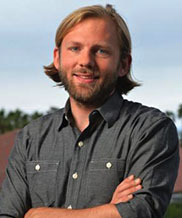Evaluating Community Interventions
 Johan Ugander is an Assistant Professor in Management Science & Engineering (MS&E) and David Morgenthaler II Faculty Fellow School of Engineering at Stanford University. His research develops algorithmic and statistical frameworks for analyzing social networks, social systems, and other large-scale data-rich contexts. He’s particularly interested in the challenges of causal inference and experimentation in these complex domains. Johan’s work commonly falls at the intersections of machine learning, probability theory, statistics, optimization, graph theory, and algorithm design. Within MS&E he’s a member of the Social Algorithms Lab (SOAL). At Stanford Johna is also affiliated with the Institute for Computational & Mathematical Engineering (ICME) and the Center for Computational Social Science. In his talk, Johan looks at…
Johan Ugander is an Assistant Professor in Management Science & Engineering (MS&E) and David Morgenthaler II Faculty Fellow School of Engineering at Stanford University. His research develops algorithmic and statistical frameworks for analyzing social networks, social systems, and other large-scale data-rich contexts. He’s particularly interested in the challenges of causal inference and experimentation in these complex domains. Johan’s work commonly falls at the intersections of machine learning, probability theory, statistics, optimization, graph theory, and algorithm design. Within MS&E he’s a member of the Social Algorithms Lab (SOAL). At Stanford Johna is also affiliated with the Institute for Computational & Mathematical Engineering (ICME) and the Center for Computational Social Science. In his talk, Johan looks at…
1. Important interventions in communities are often targeted at individuals or small groups; we know very little about how to target such interventions effectively.
2. It is possible to leverage the structure of social networks without observing them, e.g. by leveraging the “friendship paradox” to reach more connected individuals.
3. Sets of more connected individuals don’t necessarily lead to more community adoption. The most connected individuals may not be the most influential individuals.